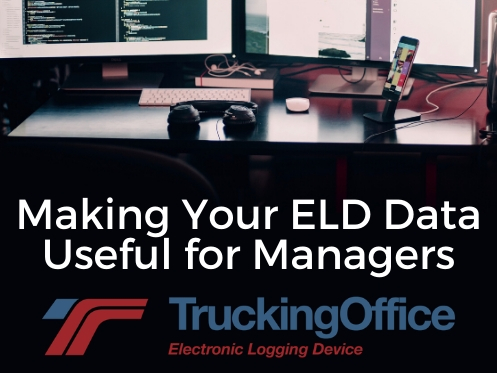The advent of new technology has introduced ELDs or electronic logging devices in the trucking industry. As a result, most truckers are now implementing these devices in a bid to harness their varied benefits. But, the primary one is that ELD connectivity helps managers to analyze all kinds of collected data. And by doing so, managers can use data to their advantage. That is, make data-driven business decisions that help cut down operating costs significantly and maximize profits.
Electronic logging devices can help you reach high levels of safety, saving, and efficiency. Nevertheless, it’s critical to ensure that data collected is useful for managers. Put simply, you need to eliminate the likelihood of errors occurring during and after implementation. But how do you make that happen? If that’s one of your worries, or don’t know where to start with ELD compliance, TruckingOffice has got your back.
In today’s post, we take a look at several ways to help you make your ELD data useful for managers by avoiding possible implementation mistakes.
Stay Away from Uncertified Suppliers
Working with a provider who is not in the FMCSA’s list of self-certified ELDs is a surefire way to make your data less useful for managers. To avoid this, you need to choose a vendor who can deliver on every technical specification as required in the electronic logging device mandate. Even better, go for one with a real-time and connected solution. That will give you the flexibility to realize tangible benefits in other areas, beyond just ELD compliance. However, don’t be tempted to go with the easiest or cheapest solution on the market.
Avoid Any Long-Binding Contracts
As you make ELD implementation, you need to consider the duration of a contract that your vendor is offering. Most providers will trick you into a long-term deal that can last somewhere between 3-5 years.
What if their services are below par? Or the data collected becomes less useful for your fleet managers, and you just want to move to a better alternative? Such a long-binding contract may begin to feel like a prison. Therefore, do not fall for a deal that lasts for more than one year. That will give you the freedom to shift when you feel the need.
Train, Train, Train!
Of course, you want to transition from paper logs to ELDs to comply with the electronic logging device mandate. That’s why proper training is of paramount importance. Fleet managers, drivers, and other users must feel comfortable adopting the electronic logging device. Lack of proper training will not only lead to an uneasy transition process but increase the possibility of ELD data errors, as well.
Don’t Miss Out on Technical Support
Another way to make data from the electronic logging device useful for managers is to ensure that you have proper support. Perhaps, this is because the technology is relatively new. That means you’ll need a lot of professional help right from purchasing to installation to implementation. For that reason, be sure to choose a vendor that offers the best technical support.
How the ELD Trucking System Works?
Long-time truckers may at first be skeptical to switch from traditional hand-written logbooks to new, totally digital Electronic Logging Device (ELD) systems, but the fact is that electronic documentation is nearly effortless.
As required by the Federal Motor Carrier Safety Administration (FMCSA), as well as the Department of Transportation (DOT), all commercial trucks must include ELD systems and related trucking software under the ELD mandate.
At its basics, TruckingOffice’s ELD system connects to the truck’s computer via the electronic control module (ECM) located under the dashboard. From here, relevant data such as miles driven, payment per miles, Hours of Service (HOS), and engine reports are sent via Bluetooth to the electronic logbook application on your device, whether it be a cell phone, tablet, or computer.
Within the app’s company interface, your trucking company can manage relevant data and store DOT records from information collected from ELD devices.
TruckingOffice’s ELD app offers many easy-to-use features, including:
- Dashboard to manage daily trucking logs and all other necessary duties
- Change duty status
- Add missing log data
- Certify daily logs
- Communicate roadside inspection reports
Software for trucking, such as ELD systems, is imperative for trucker data management and the safety of the driver as well as all other drivers on the road.
TruckingOffice is Here to Help!
If you are ready to take advantage of the benefits of ELD data while avoiding the pitfalls, TruckingOffice is all you need. It is the most affordable solution that will help you improve your company’s efficiency and reduce overall costs. Sign up for a free trial and discover just how much control, capabilities, and savings you could realize.
Need more information on the regulatory issues surrounding your ELD compliance? Give us a call at (800) 253-9647, and a specialist will get back to you with everything you need.







Recent Comments